The community lockdown for the Covid-19 has found most of us indoors in order to prevent the spread of disease. Since we cannot go out, creative culinary juices are flowing so I think up of different ways to feed the family. Our Fil-Chi family especially likes dumplings of any kind–steamed, fried, or pot stickers. Today, I am sharing my homemade gyoza recipe. I first had this in Singapore more than 20 years ago. And whenever I have the chance, I try to re-create it in my kitchen in the Philippines and reminisce the flavors.
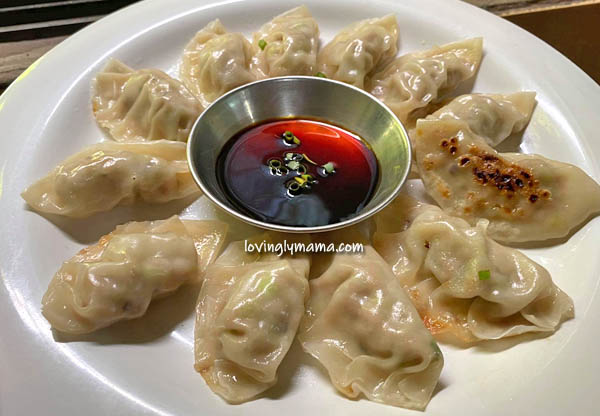
Preparing Special Dishes from my Kitchen
I like to prepare, restaurant-style dishes for my family from time to time. It’s usually during the weekends, when I don’t have work. Or at least, I can skip work. On regular days, there is a cook who prepares our meals.
From preparation to presentation, our kids enjoy these special dishes. They are used to dining in restaurants, hence they find pleasure in enjoying good dishes. Read: Basic Restaurant Manners for Kids
Now, I am not a chef – just a busy mom who has a penchant for cooking special dishes for the family. I also like plating, using whatever I have on hand.
I do not pretend that I know a lot of things. In fact, I am a rather lazy cook, preferring to use shortcuts. It’s not always slow-cooked or natural at home.
For my cooking, it’s like the end justifies the means. haha That means, I am not shy to admit that I use store-bought stuff to enhance flavor or to make my job easier. Henceforth, I am sharing with you the products I use. You have to forgive me though—sometimes, I just use whatever is in the refrigerator or the pantry. And sometimes they are just leftovers!
Why are they called pot stickers?
I know that there is much animosity between China and the Philippines at present. But our family cannot help our taste because because we have Chinese ancestry. And being a Filipino-Chinese family here in the Philippines, we just love Chinese food and eat them whenever we can. Here is a little gyoza or potstickers trivia for you.
Yummy and Healthy Gyoza or Potstickers
The Japanese gyoza is the the Chinese pot stickers or potstickers, okay? All potstickers are dumplings, but not all dumplings are made into potstickers.
A dumpling is a dish that is based on meat or vegetable fillings wrapped by pieces of dough. Wrapping can be artfully done or you can just seal the ends however you want it, just making sure that the meat won’t come out. To do this, I dab water at the edges to make sure that the two flaps stick together and seal in the filling. By the way, I usually use Robinhood dumpling wrappers. It is a product of Bacolod City, but any brand will do. Then the dumplings can be boiled, fried, simmered, or steamed.
Chinese Potstickers or Japanese Gyoza
Okay, let’s set the record straight. Pot stickers are actually Chinese in origin and the dumpling’s Chinese name is called “guotie”. This name literally means “wok stick,” haha go figure. It was said that a chef who was boiling dumplings forgot about them. After all the water had dried away, the dumplings got stuck to the pot (tie – Chi.). Oil had to be added in order to grease the wrapper and remove the dumplings. Hence, the manner of cooking.
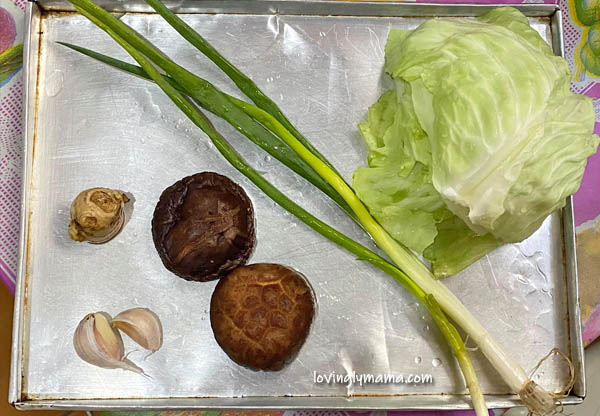
So in our modern world, potstickers are the more recognizable name for these Chinese pan-fried dumplings (a.ka. guo tie).
Meanwhile, the Gyoza is the Japanese version of the Chinese potstickers. What makes them unique and probably more familiar for us is the shape. The Gyoza is more consistently known as looking like a half-moon, which is long and thin. And I believe that with the Japanese, they prefer their dumplings with less oil. Sometimes, I feel that Chinese dishes are more oily.
Homemade Gyoza Recipe
These Japanese pot stickers are really good and healthy, too. We love them so much that we order them whenever they are available in the restaurant we are in. However, they can be quite expensive. One order is usually just 4-5 pieces, depending on the restaurant.
In order to enjoy it at home, I would occasionally prepare it for the family. I don’t always do it though, because of the preparation required. But if I have some idle time, it is actually fun and therapeutic to make – especially the wrapping part.
Without ado, here’s my homemade gyoza recipe.

Ingredients:
- 250 grams ground pork
- 3-4 cabbage leaves, chopped
- ¼ cup thinly sliced green onions
- 1 big thumb sized ginger, grated
- 4 large dried shiitake mushrooms, soaked and chopped
- 3 cloves garlic, chopped finely
- 2 Tbsps. Sesame oil
- 2 Tbsps. Rice wine vinegar (or brandy)
- 2 Tbsps. Teriyaki sauce (or soy sauce)
- Salt and pepper, to taste
- Round dumpling wrappers (store-bought)
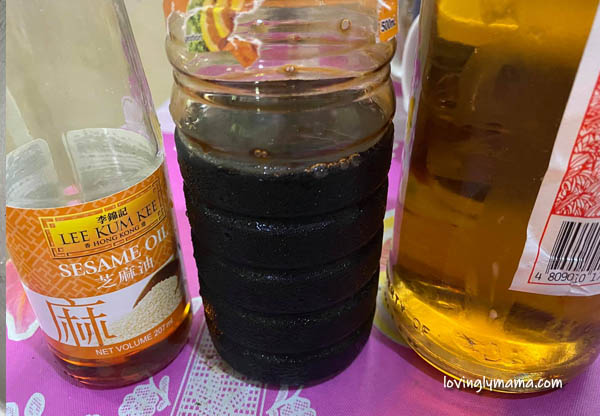
Procedure:
In a big bowl, mix all the ingredients well, making sure that the seasonings have blended with the meat and vegetables. I use a big bowl so that I have room to mix.
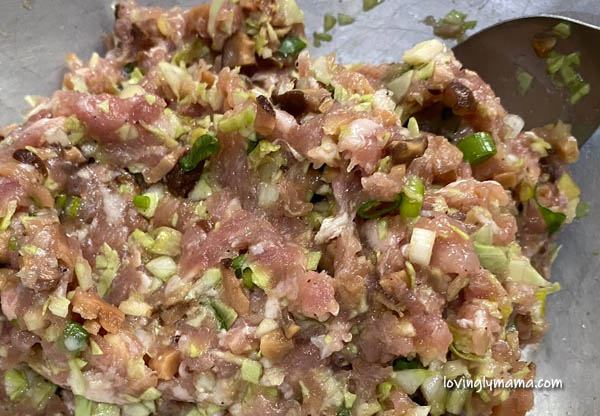
Place about a tablespoon of your meat mixture on one side of the wrapper, following a crescent shape. You can put less to make thinner gyozas and so that you can make more. Since we love the meaty part, I make sure that my gyoza is “full”.
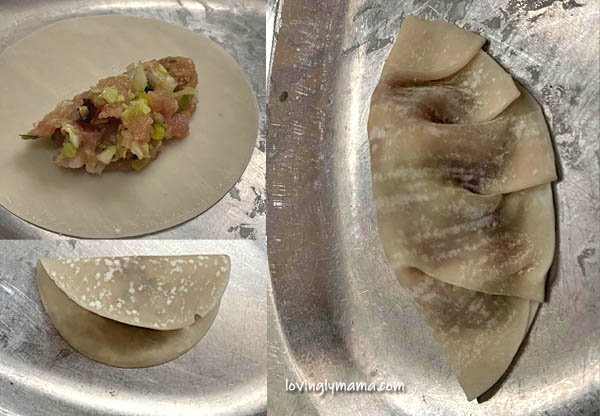
Dab some water about 3mm to the edges. You can use a fork to seal the ends. Cover the mixture with the other flap of the dumpling wrapper and seal.
You can also fold it artistically, like into a fan. Just fold every few millimeters going to one direction in order to form a fan. Press down with some water in between.
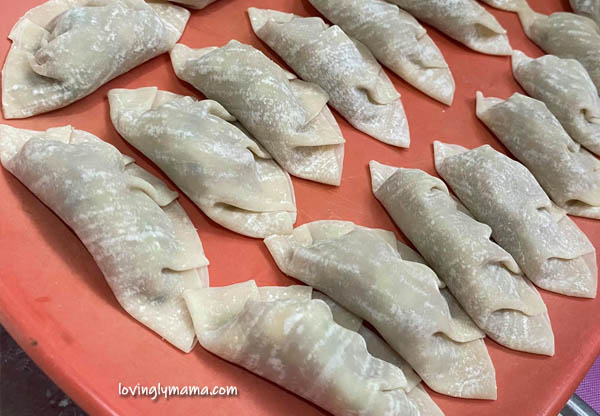
Makes about 24-30 dumplings, depending on how “filled” each one is.
To cook the Gyoza
I used a non-stick pan ( haha using a non-stick pan for potstickers, ironic). Heat a little oil on the pan and fry the gyoza for about 3 minutes on one side.
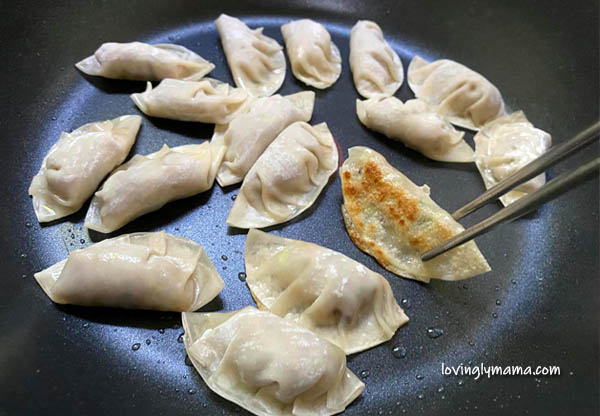
Then add ¼ cup hot water all around. Cook, uncovered, until all the liquid evaporates. The other side will have tinges of brown while the top part will be almost translucent.
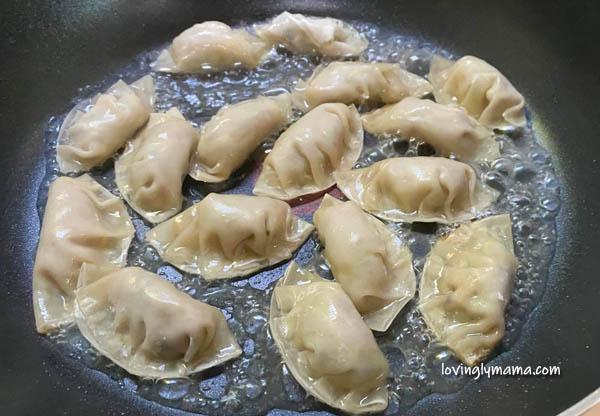
Optional After-Frying
After all the liquid has evaporated, you may drizzle some sesame soil all around and fry for another 2-3 minutes. This will make the bottom crispier.
Gyoza is a rather healthy dish, despite the frying, because it has meat, carbs, and lots of vegetables. For those who are trying to lose weight, a few pieces can already be a satisfying meal. So flavorful and filling, too.
To serve the Gyoza
The gyoza is best eaten right away. You may prepare the dumplings beforehand and freeze them until needed. But cook when you are ready to eat. It doesn’t take long anyway.
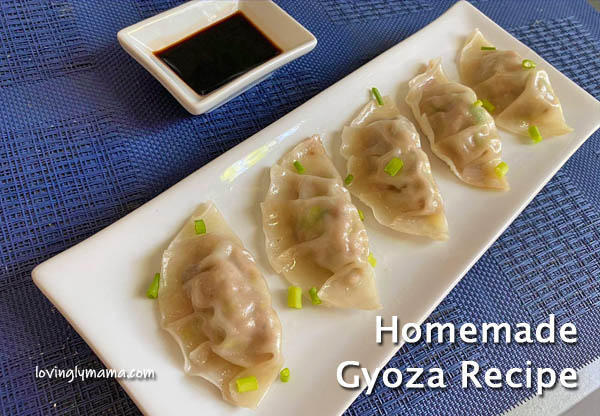
Serve it with a dip of light soy sauce. We use the Kikkoman Less Sodium Soy Sauce for the dipping sauce. If you like it spicy, add some chili oil.
Other homecooking recipes in this blog:
Meanwhile, here are other recipes that you might like to try at home. Just click on any link below:
- Arroz Caldo Recipe: How to Liven Up This Comfort Food
- DIY Shabu-shabu Hot Pot Recipe for the Family
- How to Cook KBL (Kadyos, Baboy, Langka): Ilonggo Comfort Food
- Health Benefits of Oyster Mushrooms + Recipe
- Suaje on the Rocks Recipe
- Creamy Baked Scallops with with Sliced Potato Recipe
- Balut Recipes for the Craving Mama
- Cha Misua | Chinese Birthday Misua Recipe
- Baked 40-Clove Garlic Chicken Recipe (Modified)
- Cooking with Crab Fat Paste (Aligue)
- Cooking with Chorizo | Cocina Estella Spanish Chorizo
- Shrimp Etouffee: A Cajun Seafood Recipe

